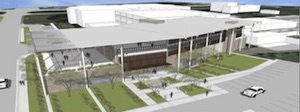 The Texas Advanced Computing Center (TACC) at The University of Texas at Austin has received approval from the UT System Board of Regents to expand its facilities. TACC’s facilities are home to computing, data, and visualization resources as well as expert staff that support cutting-edge scientific research on such topics as predicting hurricanes and developing new energy sources.
The Texas Advanced Computing Center (TACC) at The University of Texas at Austin has received approval from the UT System Board of Regents to expand its facilities. TACC’s facilities are home to computing, data, and visualization resources as well as expert staff that support cutting-edge scientific research on such topics as predicting hurricanes and developing new energy sources.
The regents approved the $20 million expansion plans at their board meeting today, clearing the way for construction to begin later this year.
The center continues to grow, and the demands for the cyberinfrastructure services provided by TACC continue to grow faster than we can possibly meet them. As part of that growth, we need a bigger home, and our project to expand the TACC facilities is taking shape,” said Dan Stanzione, executive director of TACC.
The new TACC Office Building — a three-story, 38,000-gross-square-foot building — will connect to the existing offices by way of an enclosed walkway. The building will be located in the northeast quadrant of the J.J. Pickle Research Campus on Burnet Road.
The first level of the building will house a public open lobby space, reception area, a 1,500-square-foot visualization lab — an environment of large flat-panel monitors offering an extremely high level of detail and quality for scientists to visualize and analyze data. It will also include an auditorium for approximately 260 people and a flexible training room for 50 people.
TACC conducts research in the field of advanced computing while conducting outreach to increase the awareness of the importance of advanced computing and computational science.
More than 3,000 active, funded research projects in all fields of science are benefiting from the advanced computing resources available at TACC, which includes a comprehensive ecosystem of leading-edge resources in high performance computing (HPC), visualization, data analysis, storage, cloud, data-driven computing, and software.
As a shining star in the research community, UT must set an example through the continued renewal of those tools that make modern science possible,” UT System Chancellor Francisco G. Cigarroa said. “The new facilities will allow TACC to maintain its leadership position in the field of computational science, and the UT System is proud to help enable cutting-edge scientific research through the continued financial support of TACC’s endeavors.”
The estimated completion timeframe is January, 2016.
Sign up for our insideHPC Newsletter.



